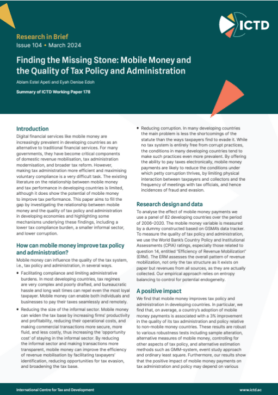Research in Brief 104
Digital financial services like mobile money are increasingly prevalent in developing countries as an alternative to traditional financial services. For many governments, they have become critical components of domestic revenue mobilisation, tax administration modernisation, and broader tax reform. However, making tax administration more efficient and maximising voluntary compliance is a very difficult task. The existing literature on the relationship between mobile money and tax performance in developing countries is limited, although it does show the potential of mobile money to improve tax performance. This paper aims to fill the gap by investigating the relationship between mobile money and the quality of tax policy and administration in developing economies and highlighting some mechanisms underlying these findings, including a lower tax compliance burden, a smaller informal sector, and lower corruption.

